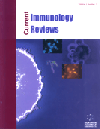-
s Autoimmune Diseases and Atherosclerosis: The Inflammatory Connection
- Source: Current Immunology Reviews (Discontinued), Volume 8, Issue 4, Nov 2012, p. 297 - 306
-
- 01 Nov 2012
Abstract
Atherosclerosis is a chronic inflammatory disease that contributes to majority of cardiovascular morbidity and mortality in the world. Immune system is involved in atherogenesis and disease pathogenesis. Several studies have suggested a pivotal role for immune response to autoantigens, particularly oxidized lipoproteins and heat shock proteins, in the development of the disease. Several autoimmune disorders such as inflammatory bowel disease (IBD), rheumatoid arthritis, psoriasis, diabetes type1, multiple sclerosis, chronic obstructive pulmonary disease (COPD) and systemic lupus erythematosus (SLE) have an increased association with atherosclerosis leading to higher cardiovascular mortality rates. Inflammation is a crucial link in the development of atherosclerosis and autoimmune disorders. Immune dysregulation in autoimmune diseases could contribute to the increased risk of atherosclerosis in these patients. Thus, immune modulation and anti-inflammatory treatments may help control the development of atherosclerosis in autoimmune disorders.


